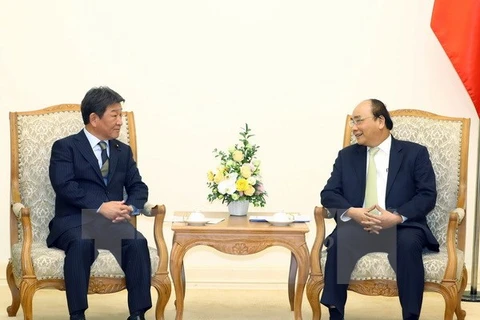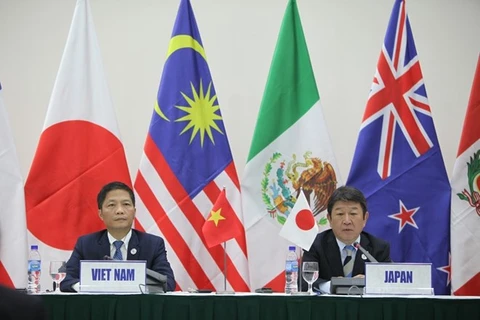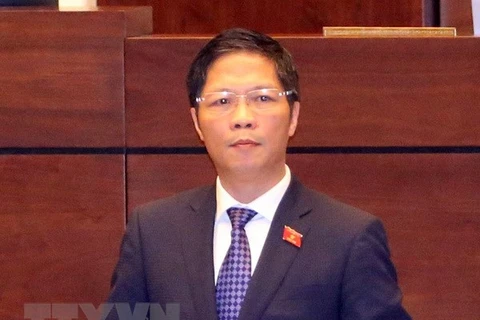Hanoi (VNA) - The Comprehensive and Progressive Trans-Pacific Partnership (CPTPP), scheduled to be inked in Chile on March 8 (local time), is expected to be a new driving force for the development of the Asia-Pacific region.
One year ago, at a high-level dialogue hosted by Chile in March 2017, 11 countries, namely Australia, Brunei, Canada, Chile, Japan, Malaysia, Mexico, New Zealand, Peru, Singapore, and Vietnam, discussed initial steps to “save” the ambitious Trans-Pacific Agreement (TPP) after the US’s withdrawal.
They agreed to maintain the deal and renamed it CPTPP.
On the context that trade protectionism is arising in many places around the world and causing negative impacts on the global economic growth, the birth of the CPTPP will make a great stride connecting economies on the Pacific Ocean rim.
Chilean Foreign Minister Heraldo Munoz said that the deal would create favourable conditions to generate more jobs, boost economic growth, improve people’s living conditions, and strengthen cooperation among the signatories.
Leaders of the 11 signatories showed their determination to promote trade liberalisation, contribute to comprehensive development and bring about benefits for not only participants but also other nations across the world.
The birth of an inclusive free trade agreement like CPTPP reflects that the Asia-Pacific region continues leading the world in economic integration and connectivity.
It also shows that in the context of globalisation, a free trade agreement system on the equal and mutually-beneficial basis is an effective solution to helping economies overcome negative consequences of crises and effectively respond to socio-economic and environmental challenges towards sustainable development. Meanwhile, trade barriers and unfair competitiveness not only affect nations’ links but also worsen trust among partners.
CPTPP sets high criteria in numerous fields, including labour, the environment, intellectual property, digital economy and cyber security.
More than 20 provisions of the CPTPP, including sensitive ones related to intellectual property, were suspended or changed in comparison to the TPP.
The agreement, once signed, will create one of the world’s largest free trade blocs with a combined market of 463 million people and GDP of around 10,000 billion USD, accounting for 13 percent of the global GDP.
It will bring about important commitments involved in non-tariff barriers, services, investment and other fields.-VNA
One year ago, at a high-level dialogue hosted by Chile in March 2017, 11 countries, namely Australia, Brunei, Canada, Chile, Japan, Malaysia, Mexico, New Zealand, Peru, Singapore, and Vietnam, discussed initial steps to “save” the ambitious Trans-Pacific Agreement (TPP) after the US’s withdrawal.
They agreed to maintain the deal and renamed it CPTPP.
On the context that trade protectionism is arising in many places around the world and causing negative impacts on the global economic growth, the birth of the CPTPP will make a great stride connecting economies on the Pacific Ocean rim.
Chilean Foreign Minister Heraldo Munoz said that the deal would create favourable conditions to generate more jobs, boost economic growth, improve people’s living conditions, and strengthen cooperation among the signatories.
Leaders of the 11 signatories showed their determination to promote trade liberalisation, contribute to comprehensive development and bring about benefits for not only participants but also other nations across the world.
The birth of an inclusive free trade agreement like CPTPP reflects that the Asia-Pacific region continues leading the world in economic integration and connectivity.
It also shows that in the context of globalisation, a free trade agreement system on the equal and mutually-beneficial basis is an effective solution to helping economies overcome negative consequences of crises and effectively respond to socio-economic and environmental challenges towards sustainable development. Meanwhile, trade barriers and unfair competitiveness not only affect nations’ links but also worsen trust among partners.
CPTPP sets high criteria in numerous fields, including labour, the environment, intellectual property, digital economy and cyber security.
More than 20 provisions of the CPTPP, including sensitive ones related to intellectual property, were suspended or changed in comparison to the TPP.
The agreement, once signed, will create one of the world’s largest free trade blocs with a combined market of 463 million people and GDP of around 10,000 billion USD, accounting for 13 percent of the global GDP.
It will bring about important commitments involved in non-tariff barriers, services, investment and other fields.-VNA
VNA
























